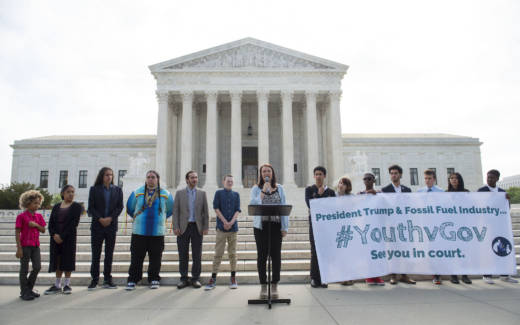“It’s just really disappointing to see the lengths that they go to — to not only not let us get the remedy that we’re seeking, but not even let us have the chance to prove our facts or present our case at trial,” said Nathan Baring, a 19-year-old from Fairbanks, Alaska, who joined the lawsuit when he was 15.
As the case drags on, sea ice that protects coastal Alaska communities from fierce storms is forming later in the year, leaving those villages vulnerable, he said. Earlier today, the National Oceanic and Atmospheric Administration announced a bleak milestone. Carbon dioxide levels hit a record high in May, with average levels peaking at 414.7 parts per million, which surpassed the previous record of 411.2 ppm a year ago.
Watch Wednesday’s proceedings before the 9th U.S. Circuit Court of Appeals in Portland:
The young people argue that government officials have known for more than 50 years that carbon pollution from fossil fuels causes climate change and that policies promoting oil and gas deprive them of their constitutional rights to life, liberty and property.
Lawyers for President Donald Trump’s administration say the young people didn’t find any “historical basis for a fundamental right to a stable climate system or any other constitutional right related to the environment.”
The lawsuit says the young are more vulnerable to serious effects from climate change in the future. The American Academy of Pediatrics, 14 other health organizations and nearly 80 scientists and physicians agreed in a brief filed with the appeals court.
They pointed out that the World Health Organization estimates that 88% of the global health burden of climate change falls on children younger than 5.
The lawsuit wants the U.S. District Court in Eugene, where the lawsuit was filed, to declare that the U.S. government is violating the plaintiffs’ constitutional rights by substantially causing or contributing to a dangerous concentration of carbon dioxide in the atmosphere.
If the 9th Circuit judges decide the lawsuit can move forward, it would go before the federal court in Eugene. The appeals court judges heard arguments Tuesday but were not expected to rule right away.
The case has become a focal point for many youth activists, and the courtroom in Portland was packed. Baring said he and his co-plaintiffs have matured as the case has wound through the legal system.
“I never anticipated how much I was going to grow up, or how much the group was going to grow up,” he said.

